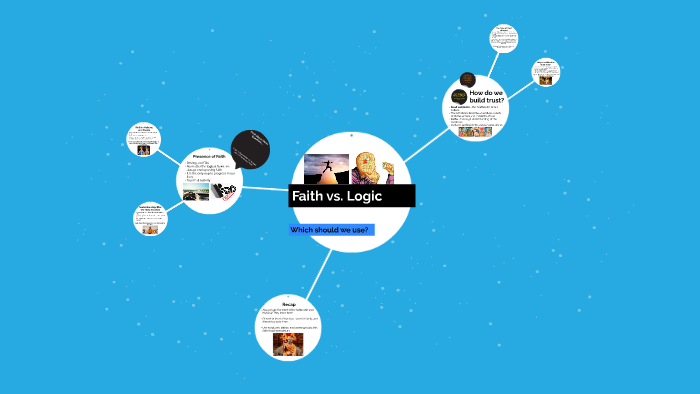In the intricate tapestry of human understanding, particularly within the realm of spirituality, the relationship between faith and logic has often been a subject of contemplative discourse. One might ponder, can one truly harmonize the seemingly antithetical concepts of faith and logic? This playful query invites a deeper exploration into the Bahá’í teachings, illuminating the profound and nuanced interplay between these two foundational dimensions of human experience.
The Bahá’í perspective posits that both faith and logic are not merely competing ideologies but are, in essence, complementary forces that enrich one’s spiritual journey. This convergence holds critical implications for individual seekers as well as for the collective advancement of humanity. By delving into the definitions and functions of faith and logic within Bahá’í teachings, one can appreciate how these elements cohesively contribute to a holistic worldview.
To begin, faith in the Bahá’í context is not a blind allegiance or an abdication of reason; rather, it is an active commitment to the pursuit of truth. Bahá’u’lláh, the founder of the Bahá’í Faith, emphasized that genuine faith must be grounded in an understanding of divine verities, cultivated through personal reflection. This active engagement sets the stage for an informed belief system, distinct from dogmatic adherence. When individuals embrace faith as a process of discovery, they become empowered to question and seek, thus promoting intellectual engagement.
On the other hand, logic serves as a pivotal tool in discerning truth. In the Bahá’í writings, the application of reason is encouraged as a means of validating spiritual insights. Logic allows adherents to navigate the complexities of existence, providing a framework through which knowledge can be examined and expanded. The utilization of logic is not simply a scholarly pursuit; it embodies a spiritual discipline that fosters clarity and understanding. It acts as a beacon, guiding individuals toward deeper realizations and away from unfounded superstitions.
In contemplating the delicate balance between faith and logic, one encounters an essential principle within Bahá’í teachings: the unity of science and religion. Bahá’u’lláh articulated that true religion should not conflict with science, as both arise from the same divine source. This perspective roots itself in the belief that spiritual truths, when properly understood, will inevitably align with empirical reality. Thus, the Bahá’í Faith champions the integration of logical reasoning with spiritual insight, advocating for a synthesis rather than a dichotomy.
Moreover, the interaction between faith and logic fosters a vibrant environment for dialogue. In diverse communities, individuals can explore differing viewpoints with open hearts and discerning minds. This culture of respectful discourse cultivates a rich soil for collective growth. By harmonizing faith and reason, adherents are encouraged to engage in meaningful conversations that transcend superficial differences. This process not only nurtures personal development but also fortifies communal bonds.
However, the integration of logic and faith is not without its challenges. Occasionally, individuals may find themselves ensnared in the quagmire of skepticism, where the relentless pursuit of proof undermines their capacity for faith. Conversely, there exist those who embrace a faith devoid of rational inquiry, leading to dogmatism. The Bahá’í teachings advocate for a robust equilibrium, where one maintains a critical perspective while nurturing faith. This pursuit of balance is integral to achieving a profound understanding of divine truths.
The Bahá’í writings further assert that the pursuit of knowledge should be continuous, encouraging followers to embrace change as a natural part of their spiritual evolution. “The greatest gift is the gift of understanding,” Bahá’u’lláh asserts. In this light, faith does not stagnate; it evolves through personal experience and the application of reason. Individuals are encouraged to revisit their beliefs, assess them critically, and embrace new insights that may emerge through study and reflection.
Ultimately, the interplay between logic and faith cultivates a profound sense of purpose. When harmonized, these elements empower individuals to actively engage with life’s myriad complexities, enhancing both personal fulfillment and societal advancement. This duality serves as a guiding principle for Bahá’ís, encouraging them to pursue a life marked by both spiritual enrichment and intellectual rigor.
In summary, Bahá’í teachings illuminate the fertile ground where logic and faith converge. Each plays a vital role in fostering a comprehensive understanding of existence that transcends the confines of dualism. By engaging both the rational and the spiritual, one can embark on a journey toward truth that is intricate, fulfilling, and full of potential. The challenge remains for individuals to navigate this path thoughtfully, recognizing that the integration of faith and logic is not merely an intellectual exercise but a profound spiritual quest that beckons with the promise of deeper understanding and collective unity.
